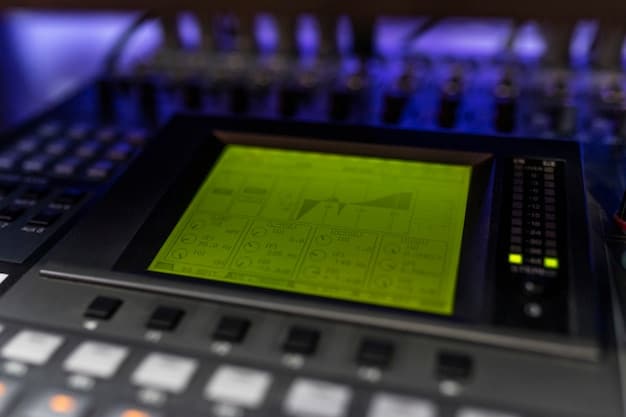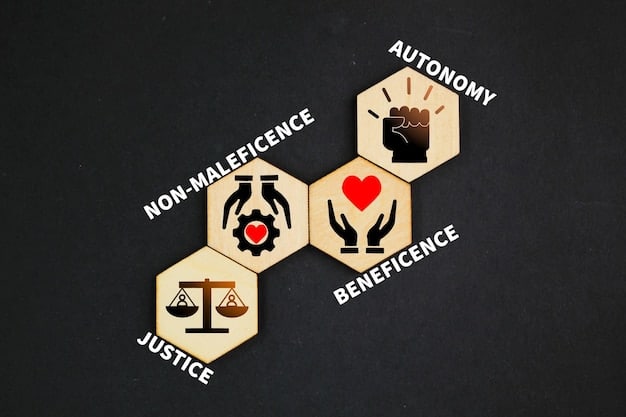Unlock Passive Income: Licensing Your Music for Film & TV in 2025

Explore how to generate passive income in 2025 by licensing your music for film and TV, understanding royalty structures, and navigating the evolving landscape of music licensing agreements.
Eager to transform your musical talent into a stream of passive income from royalties by licensing your music for film and TV in 2025? This guide explores the ins and outs of music licensing, helping you navigate the process and maximize your earning potential.
Understanding Music Licensing for Passive Income
Music licensing is the process of granting permission for someone else to use your copyrighted music. This use can take many forms, including synchronization licenses for film and TV, mechanical licenses for reproduction, and performance licenses for public broadcasts. Understanding these different types of licenses is crucial for effectively monetizing your music.
Types of Music Licenses
There are several key types of music licenses that artists can leverage for passive income. Each type covers a different form of usage and compensates rights holders accordingly.
- Synchronization License: This allows the licensee to synchronize your music with visual media, like films, TV shows, and commercials.
- Mechanical License: This grants permission to reproduce and distribute your music in physical or digital formats, such as CDs, records, or downloads.
- Performance License: This covers the public performance of your music, whether it’s played on the radio, in a venue, or streamed online.
- Master Use License: This license grants the right to use a specific recorded version of a song, in addition to the underlying composition.
Effectively navigating these licenses can open significant avenues for passive income, ensuring you’re compensated each time your music is used in different media.
Preparing Your Music for Licensing Opportunities
Before you can start earning royalties, you need to ensure your music is properly prepared and ready to be licensed. This preparation involves several key steps, from copyright registration to creating high-quality recordings.
Copyright Registration
Copyright registration is a foundational step in protecting your music and enabling you to license it effectively. Registering your copyright with the U.S. Copyright Office provides legal proof of your ownership, which is essential for enforcing your rights and collecting royalties.
Without proper copyright registration, it becomes challenging to track and claim royalties generated from the use of your music across various platforms and media outlets.
Creating High-Quality Recordings
The quality of your recordings significantly impacts your chances of landing licensing deals. Film and TV producers are looking for professional-sounding tracks that enhance their projects.

- Invest in Professional Equipment: Use high-quality microphones, audio interfaces, and recording software to capture clean and clear audio.
- Mastering is Key: Ensure your tracks are professionally mastered to achieve optimal loudness and clarity across different playback systems.
- Mix with Precision: Pay close attention to the mixing process, balancing the different elements of your song to create a cohesive and polished sound.
By focusing on creating high-quality recordings, you make your music more attractive to potential licensees.
Finding and Approaching Music Supervisors
Music supervisors play a crucial role in selecting music for films, TV shows, and commercials. Building relationships with these professionals can significantly boost your licensing opportunities. Knowing how to find and approach them is a valuable skill.
Networking Opportunities
Networking is vital. Attend industry events, music conferences, and workshops to meet music supervisors in person. These events provide a platform to introduce yourself and your music.
Engage in conversations, exchange business cards, and follow up with them afterward to maintain contact.
Crafting Your Pitch
When reaching out to music supervisors, it’s essential to craft a compelling pitch that highlights the unique qualities of your music and its suitability for their projects.
- Personalize Your Approach: Research the music supervisor’s previous projects and tailor your pitch to align with their style and preferences.
- Highlight Key Information: Clearly state the genre, mood, and any unique characteristics of your music that would make it a great fit for film or TV.
- Provide Easy Access: Include links to your best tracks on platforms like SoundCloud or your website, making it easy for them to listen and evaluate your music.
A well-crafted pitch demonstrates your professionalism and increases the likelihood of getting your music considered for licensing opportunities.
Understanding Royalty Structures and Payments
Navigating the royalty structures and payment processes in music licensing can be complex. Understanding how royalties are calculated and distributed is essential for ensuring you receive fair compensation for your work.
Types of Royalties
There are several types of royalties associated with music licensing, each covering different aspects of music usage. These include synchronization royalties, mechanical royalties, and performance royalties.
Synchronization royalties are paid when your music is used in visual media. Mechanical royalties are generated from the reproduction and distribution of your music. Performance royalties come from the public performance of your music, such as radio airplay or live performances.
Working with Performance Rights Organizations (PROs)
Performance Rights Organizations (PROs) like ASCAP, BMI, and SESAC play a crucial role in collecting and distributing performance royalties to songwriters and publishers. By affiliating with a PRO, you can ensure that you receive royalties generated from the public performance of your music.

- Register Your Songs: Make sure to register all your songs with your chosen PRO to track and collect performance royalties accurately.
- Understand Royalty Splits: Familiarize yourself with how royalties are split between songwriters and publishers to ensure fair compensation.
- Monitor Your Statements: Regularly review your royalty statements to identify any discrepancies and ensure accurate payment.
Effectively managing your royalties through PROs is crucial for maximizing your passive income from music licensing.
Negotiating Music Licensing Agreements
Negotiating favorable music licensing agreements is vital for ensuring you receive fair compensation and protect your rights. Understanding the key terms and clauses in these agreements is essential for making informed decisions.
Key Terms to Consider
When reviewing a music licensing agreement, pay close attention to the following terms:
- Territory: Define the geographic areas where the licensee has the right to use your music.
- Term: Specify the duration of the license, including the start and end dates.
- Exclusivity: Determine whether the license is exclusive (meaning you cannot license the music to anyone else during the term) or non-exclusive.
Seeking Legal Advice
Given the complexities of music licensing agreements, it’s advisable to seek legal advice from an experienced entertainment lawyer.
A lawyer can help you understand the legal implications of the agreement, negotiate favorable terms, and protect your interests.
Future Trends in Music Licensing for 2025
The music licensing landscape is continuously evolving, with new trends and technologies shaping how music is used and monetized. Staying informed about these changes is essential for maximizing your passive income potential in 2025.
Emerging Technologies
One key trend is the increasing use of AI and machine learning in music production and licensing. These technologies are streamlining the process of creating and licensing music, offering new opportunities for artists.
AI-powered platforms can help match your music with specific projects, automate royalty tracking, and even generate new tracks based on your existing catalog.
The Rise of Streaming and Digital Media
The growth of streaming services and digital media continues to impact music licensing. Online platforms like YouTube, TikTok, and Twitch are becoming increasingly important for music discovery and usage.
Understanding how to license your music for these platforms and navigate their royalty systems is crucial for generating passive income in the digital age.
| Key Point 🎧 | Brief Description 📝 |
|---|---|
| 🎵 Music Licensing | Granting permission to use copyrighted music for various purposes. |
| ✍ Copyright | Register your music to protect ownership and rights. |
| 🤝 PROs | Join performance rights orgs to collect royalties. |
| 💼 Agreements | Negotiate licensing agreements carefully. |
Frequently Asked Questions (FAQ)
▼
A synchronization license grants permission to synchronize your music with visual media, such as films, TV shows, commercials, and video games. It’s essential for anyone wanting to use your music in these contexts.
▼
You can register your music with the U.S. Copyright Office online through their website. You’ll need to provide information about the song, its authors, and submit a copy of the recording or sheet music.
▼
PROs like ASCAP, BMI, and SESAC collect performance royalties on behalf of songwriters and publishers. They monitor public performances of music and distribute royalties to their members.
▼
Key terms to consider include the territory covered by the license, the duration of the license (term), whether the license is exclusive or non-exclusive, and the amount and payment schedule for royalties.
▼
Attend industry events, music conferences, and workshops where music supervisors may be present. Online databases and professional networking sites like LinkedIn can also help you find and connect with them.
Conclusion
Generating passive income from royalties by licensing your music for film and TV in 2025 requires a strategic approach. By understanding the licensing landscape, preparing your music, building relationships with key industry players, and staying informed about emerging trends, you can unlock new opportunities and turn your musical talent into a sustainable income stream.





